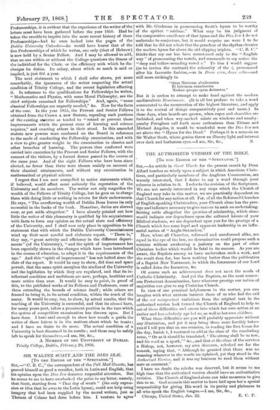SIR WALTER SCOTT ..AND THE DIES IRE. [To THE EDITOR
OF THE " SPECTATOR.")
Sin,—" C. B. C.," the correspondent of the Pall Mall Gazette, has proved himself so good a versifier, both in Latin and English, that his opinion upon the Dies Ina deserves respectful attention. But he seems to me to have overlooked the point in my letter, namely, that Scott, starting from "That day of wrath " (the only expres- sion or idea that he owes to the Latin hymn), could not help using imagery that had been supplied by the sacred writers, just as Thomas of Celano had done before him. I venture to agree with Mr. Gladstone in pronouncing Scott's hymn to be worthy of the epithet " sublime." What may be his judgment of the comparative excellence of that hymn and the Dies Ira I do not undertake to conjecture, but it would surprise inc were I to be told that he did not admit that the grandeur of the rhythm elevates the modern hymn far above the old clipping triplets. "C. B. C." thinks that my ear has been accustomed only to the " English way" of pronouncing the vowels, and commends to my notice the "deep and hollow-sounding vowel u." To him I would suggest (as he invites the contrast) the solemnity of the i, pronounced after his favourite fashion,—as in Deces eerw, deees cella—and still more strikingly in "Quee Marooam absolreestee Et latronem exaudeestee Moehee quoque spom dedeestoo."
But it is useless to attempt to make head against the modern mediaavalistic Renaissance. (It is all but profane to take a word consecrated to the resurrection of the highest literature, and apply it to the revival of things comparatively poor and mean.) Iu these days, when beards are grown, when copes and chasubles are furbished, and when wry-necked saints on windows and namby- pamby Peruginos call forth more enthusiasm than Titians and Michael Angelos, it would be wonderful were the Dies Irm not set above the " Hymn for the Dead." Perhaps it is a nemesis on Sir Walter Scott, whose genius threw an illusory light and interest
over dark and barbarous eyes.—I am, Sir, &c., S.






























 Previous page
Previous page